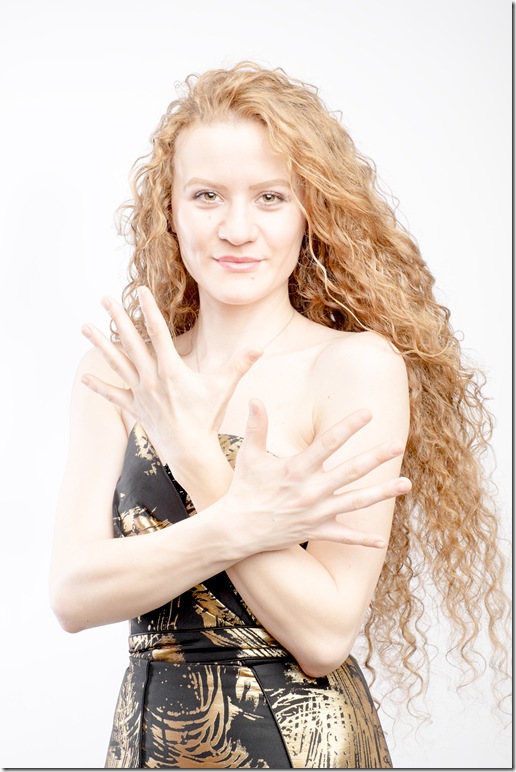It was a quiet Sunday afternoon, just before rain and cool air finally gave our overheated state a gentle winter benediction, and inside at the Boca Steinway Gallery, an overflow crowd heard a fine recital of core piano repertory by a young Russian pianist.
Asiya Korepanova, a native of Russia’s Udmurtia republic, earned her doctorate under Santiago Rodriguez at the University of Miami and has appeared several times on Abram Kreeger’s Piano Lovers series at the gallery. She returned Sunday with music of J.S. Bach, Chopin, Beethoven and Schubert, in heavily Germanic contrast to the Russian music she’s featured previously, such as her own powerful transcription of the Rachmaninov Cello Sonata.
Korepanova is above all a poetic pianist; the most affecting parts of her performance Sunday were in the intimate moments, which in her hands had a wide variety of softness and tenderness. This was evident in the first piece, Myra Hess’s noble arrangement of the popular Bach chorale Jesu, Joy of Man’s Desiring (originally from the cantata Herz und Mund und Tat und Leben, BWV 147).
Korepanova played this much like Hess herself, very slowly and quietly, singing out with lovely, well-placed tone in the chorale-melody sections of the work. But she also pedaled it with a slight blur, which it gave it something of a postmodern warmth. Above all, it was inner-directed, a highly personal meditation rather than a statement of secure joy in faith.
Two Chopin works followed, both of them in F-sharp major: The Barcarolle (Op. 60) and the Impromptu No. 2 (Op. 36). She both of them quite well, particularly in handling their heroic sections, both of which have hugely awkward left-hand work to buttress all that pianistic breast-beating. Korepanova gave the Barcarolle a bravura reading, with impressive virtuosity and a thorough command of dynamic range and interpretive variety. It lacked a certain lightness, though; it sounded somewhat labored at the outset, when the left hand should murmur and the right enter almost offhandedly, as if a gondolier were whistling without thinking about it. I would have welcomed a different, more mysterious approach, too, in the solo right hand before the contrasting middle section.
She did interesting things with the opening of the Impromptu, playing the first melody in a gradually unfolding way that was very effective, and she was able to raise a tremendous amount of power for the martial section that follows the opening. It’s marked forte from the start of that section, but it might be more effective for a pianist with this kind of sonic range to start it from a distance, like an approaching army, and then let loose a few bars later. She played those galumphing left-hand leaps with precision and accuracy, and kept a steady lyric line throughout the whole piece, unifying it nicely.
Beethoven’s 32 Variations in C minor (WoO 80), which came next, is a wonderful example of how much music the composer was able to create from very unpromising material. Korepanova is an excellent Beethoven player, with a good feel for this music’s drive and sense of surprise. There were subtle touches in the bunch-the-chords way she set up the three-note answers of the fifth variation, and she made the most of the harmonic restlessness of the ninth variation. Most importantly, she let the work sound like the variations were freshly inspired, and that’s what gives this unusual set such a distinct character.
Korepanova closed the formal portion of her recital with the Wanderer Fantasy (in C, D. 760) of Franz Schubert, a piece in which Schubert’s Beethoven fixation is heavily apparent. This played well into Korepanova’s strengths, and there was admirable clarity in the big arpeggios of the main theme and in the octaves of the final fugato. The pianist’s energy here never flagged, which is notable given the tiring tendency of Schubert’s often-thick writing. The second movement (which quotes the song that gives the work its title) was beautifully played, with exquisite tenderness in the serene E major central episode.
The third movement, however, was too similar in forthright strength as the first and fourth movements; even if the material returns to the main theme, the movement and its trio section needed to have more of the spirit of the dance. Still, this was a very well-played and exciting Wanderer Fantasy, and the exceptional clarity of its many showoff figurations showed hard practice on Korepanova’s part, with laudable results.
After the sellout room stood and applauded in appreciation, Korepanova thanked them with three encores: the “Elegiaic Song” (Op. 72, No. 14) and “Méditation” (Op. 72, No. 5) from Tchaikovsky’s last piano collection, 18 Morceaux; and Franz Liszt’s treatment of Schumann’s song “Widmung.” In the Tchaikovsky selections, Korepanova stayed well away from the salon, and played them cleanly and directly, without overdoing the sentiment; the trills-laden ending of the “Méditation” was masterful.
Her ability to play with strength and sweep, in evidence in the musically overwrought middle section of the “Méditation,” was in full flower for the Liszt, which transforms a sweetly simple song of loving devotion into a man in 1830s dress screaming “Stella!” on the streets of Düsseldorf. Korepanova is a very fine Liszt player, too, technically accurate and interpretively in tune with the transcription’s bigness and drama.
